Bybit and Coinbase both offer intuitive and easy-to-use features and also account for millions of trading activity on their websites. Hence, here is a brief comparison for both the exchange platforms, Bybit vs Coinbase, to give you more significant insights into what all they have in store to offer and help you make a meticulous decision.
Table of Contents
Summary (TL;DR)
- Bybit is a cryptocurrency derivatives exchange platform that focuses on leverage/future trading.
- Coinbase is a top cryptocurrency exchange in USA where you can buy and sell different crypto tokens.
- Bybit is a derivatives exchange platform wherein they use the maker rebate and taker fee model, both fixed at 0.025% and 0.075%, respectively.
- Coinbase, however, has a somewhat fluctuating fee band typically in the range of 0.04% to 0.5%
- Both the platforms have robust security and excellent customer care service.
- Both the platforms have an efficient and smooth running mobile application for Android and iOS.
Also Read: How to use Bybit in the USA (United States)?
What is Bybit?
Founded in 2018 and based in Singapore, Bybit is a unique cryptocurrency derivatives exchange platform that focuses on leverage trading. As a result, it offers up to 100 times leverage, essentially on trading pairs like BTC/ USD and ETH/ USD. Moreover, it has also built up considerable and sizable liquidity in a short period.
One noteworthy point here is that you cannot use Bybit in the US, just like numerous other exchange platforms, due to US regulatory issues. Recently, they even enabled the user to mint, purchase, and bid on NFTs.
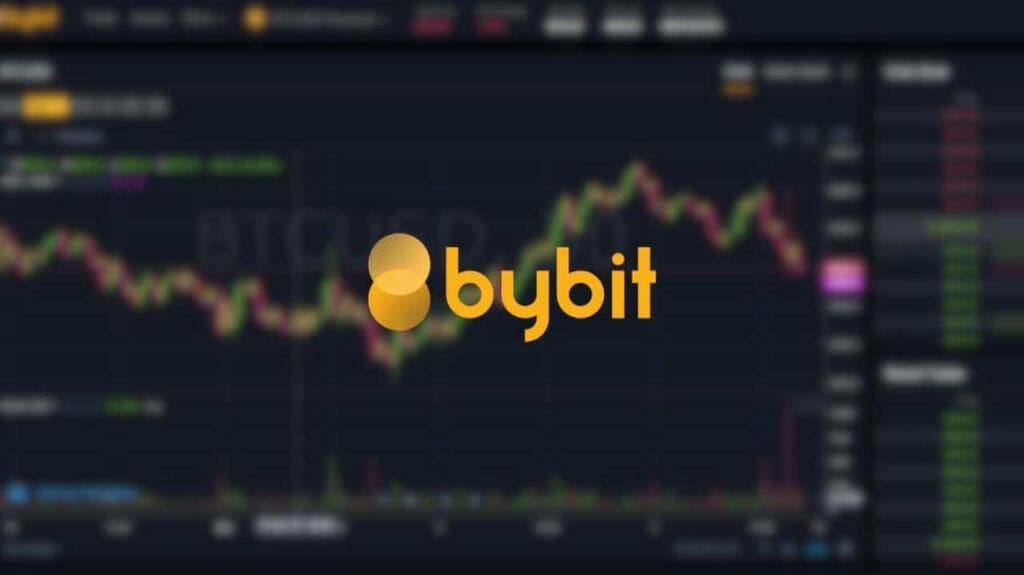
What is Coinbase?
Founded in 2012, way before Bybit existed, Coinbase is a cryptocurrency trading platform that offers its users a varied range of tokens to buy from. With ample liquidity, a powerful engine supporting its backend, and a 24-hour trade volume crossing the 5 billion mark, it is clearly evident that Coinbase is significantly a player in this crypto market. Hopping on to the bandwagon, Coinbase also offers NFTs for trade to their users.
However, the trade volume of Coinbase is much smaller than Bybit, whose trade volume exceeded the 11 billion thresholds as of today’s publication. But in all fairness, that is no way to compare two exchange platforms.
To learn more, read Coinbase Review | Is it the Best Crypto Exchange in the USA?
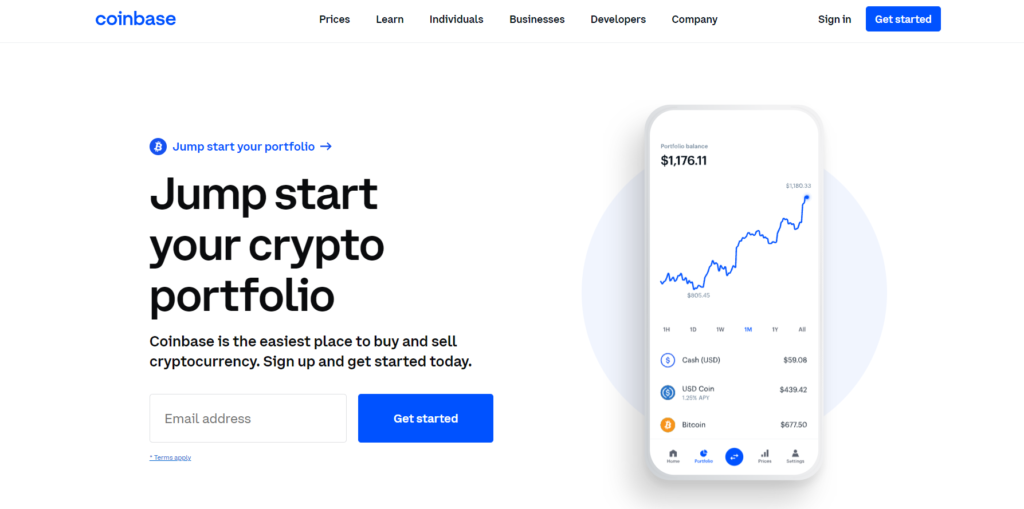
Also read, Top 7 Coinbase Alternatives [Latest]
Bybit vs Coinbase: Features Overview
To get the gist of both the platforms, first, let us get an overview of all the features they comprise of. Bybit’s main target product is perpetual futures contracts, either inverse or USDT. These contracts can be bought with tremendous leverage. Spot and derivatives trading is also available on this platform.
On the other hand, Coinbase is a pure cryptocurrency exchange platform wherein you can enhance your crypto portfolio. They offer no leverage or fancy derivatives.
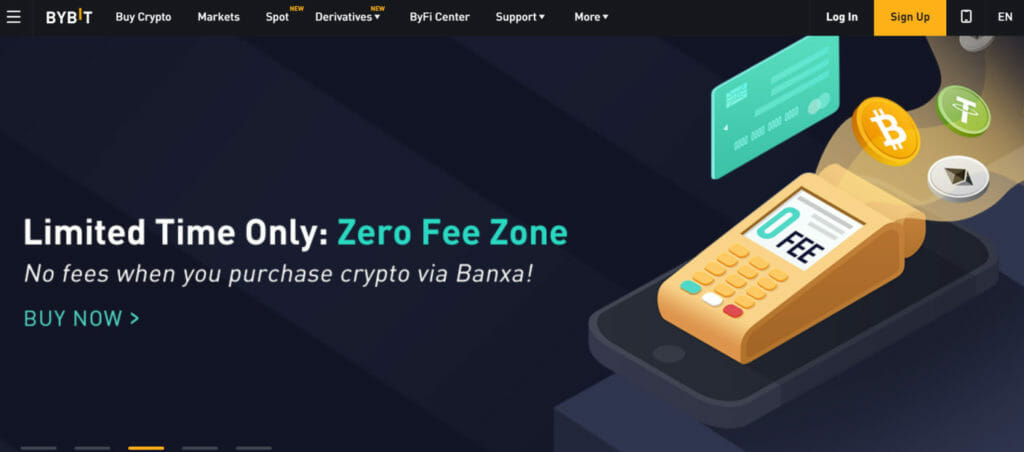
To think which one is the best among these two, it is necessary that you know what you want to do with your money. If you need to buy cryptocurrency with a debit card or bank account, Coinbase is a great choice.
On the other hand, If you want to trade futures and some of the more popular exchanges, then perhaps Bybit is a good choice. Pointing out the same thing again, it is entirely up to you and your likability, and also what you want to explore and invest in. One thing that both platforms have in common is that they take security very seriously; neither one has been hacked to date.
Also read, Coinbase Staking – Earn staking rewards on your Crypto
Bybit vs Coinbase: Trading Fees
The difference between the fees of these platforms is attributed to the fact that these two are such different platforms. Bybit is a derivatives exchange platform wherein they use the usual model of maker rebate and taker fee.
Regardless of the asset, market makers on Bybit receive a 0.025% rebate. It means that by creating a new order, a trader can receive a 0.025% bonus when somebody else takes the other side of the trade. The taker fee is 0.075%. Bybit does not charge a fee to deposit cryptocurrency to the exchange. More about Bybit’s fees can be found below and here for a more thorough explanation.

Coinbase has a relatively higher trading fee for their spot market compared to Bybit. Coinbase charges a lump sum fee of about 0.5% for the crypto spot trading, sales, and purchases on their platform.
However, the rate is highly volatile and depends significantly on market fluctuations. Sometimes they can go as low as 0.04%. For more information, refer to this page.
Bybit vs Coinbase: Supported cryptocurrencies
Currently, P2P on Bybit supports nine fiat trading pairs: INR/USDT, VND/USDT, AUD/USDT, HKD/USDT, MYR/USDT, PHP/USDT, RUB/USDT, TWD/USDT and UAH/USDT. In terms of trading, they offer perpetual futures contracts on five cryptocurrencies: BTC, USDT, ETH, XRP & EOS.
Coinbase supports Fiat deposits as well as more than 20 cryptocurrencies. Some of those include ETH, BTC, XRP, BAT, DAI, XLM, USDC & MKR. A complete list of supported coins is available here. It is important to note, however, that not all coins are available in all jurisdictions.
Bybit vs Coinbase: Liquidity
While liquidity might not matter for the average trader, trading a few hundred dollars at a time, it becomes more important when you trade more. Bybit claims about $11,146,600,774.48 in trades in the last 24 hours (source: CoinMarketCap). On the other hand, Coinbase’s volume is reliable and copper-bottomed. In the last 24 hours, they reported $5,030,529,348.88 in trades.
It is manifested clearly from the stats that Bybit is clearing twice as many trades as Coinbase, so users considering signing up for Coinbase should investigate their liquidity carefully.
Also read, What is a Coinbase Transaction?
Bybit vs Coinbase: Customer Care
If you run into any problem while using Bybit or Coinbase, be assured of a speedy resolution of the same as both these platforms provide multiple customer support channels.
Bybit has support available round the clock as their live chat works 24/7. Hence, no matter what time of the day you prefer to trade, there will always be someone to answer your queries if you have an issue. Also, the support is multilingual to cater to traders from all over the world. With Coinbase, the live chat is only available during US working hours.
However, they have an edge when responding to customer emails as they try to always send the responses in under 24 hours.
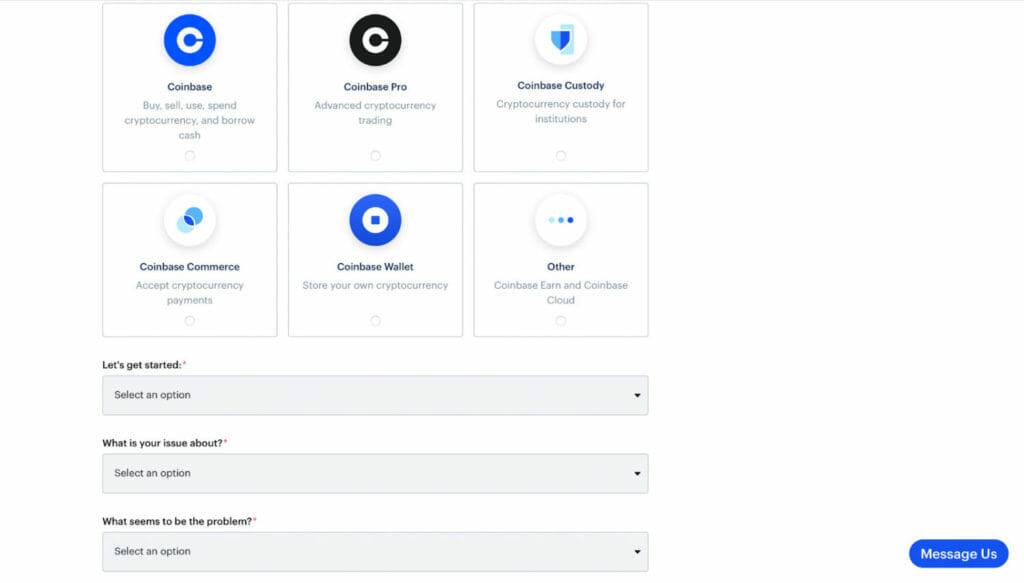
Bybit vs Coinbase: UI
For veteran cryptocurrency traders, the charting interface is one of the most critical factors for using a crypto currency exchange platform. If you’re familiar with trading on BitMEX or Binance, you will love the trading on Bybit that has a charting interface, which is far more futuristic and loaded with magnificent technical analysis tools and features. But we might as well add that the User Interface of Bybit might be a little intimidating for new traders. For experienced traders, it might be perfectly fine.
The user interface of Coinbase is intuitive, user-friendly, and extremely simple and sleek for anyone to use. Coinbase offers a clean, simple way to buy and sell cryptocurrency with only a few options for placing orders.
The charting feature might be a little intimidating for new and naive users, and the absence of that proves to be a boon for someone just entering into the arena of the trading and cryptocurrency world.
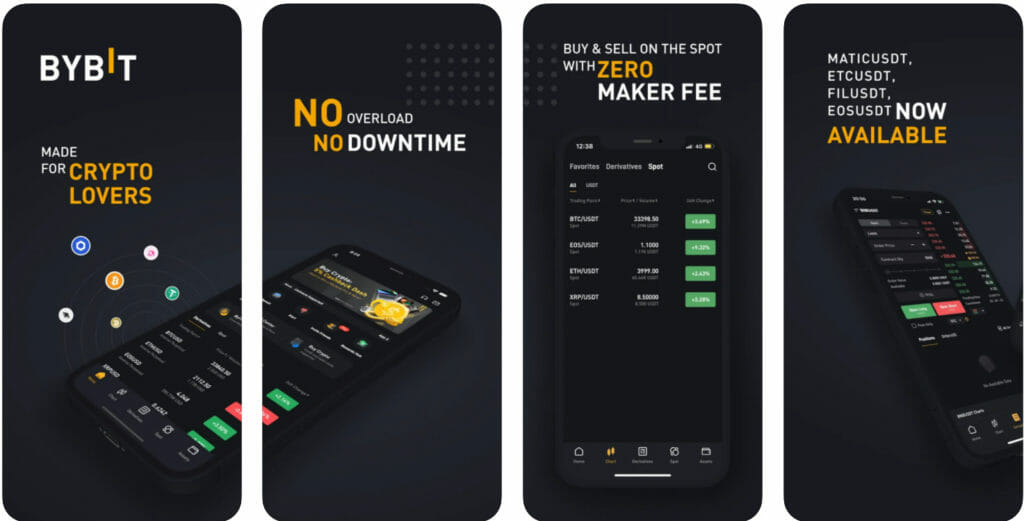
Bybit vs Coinbase: Security
In terms of security, Bybit keeps a majority of its funds in a cold wallet. In fact, deposits go directly to a cold wallet which minimizes the chance of funds being lost. The assets in Coinbase are also stored in hosted or cold wallets, i.e., third parties holding your coins.
Moreover, Coinbase also has Coinbase wallets in which your assets are more secure than the ordinary cold wallets. Bybit and Coinbase both have never been hacked, and they carefully screen all withdrawal requests in order to ensure their authenticity.
Also read, Metamask vs Coinbase Wallet: Lowest Fee Crypto Wallet
Bybit vs Coinbase: Registration Requirements
The registration process in Bybit is extremely easy. The only thing Bybit requires to use their platform is a valid email address. They will send you a confirmation code on your mentioned email, and voila! Your account is ready. There is no need for KYC, at least as of now.
On the other hand, Coinbase is significantly more confining. They have a mandatory KYC program whereby all new users must submit a photo of some form of identification, whether a passport or driver’s license or Aadhar.
Also read, How to Delete a Coinbase Account?
Bybit vs Coinbase: The Mobile App
Coinbase provides its users with a mobile application both on Android and iOS. Just like their website, their mobile application is easy to use with a functional and straightforward user interface. Bybit’s mobile application service is also available on iOS and Android. Mobile application’s user interface is much more user-friendly for beginners, unlike their desktop one.
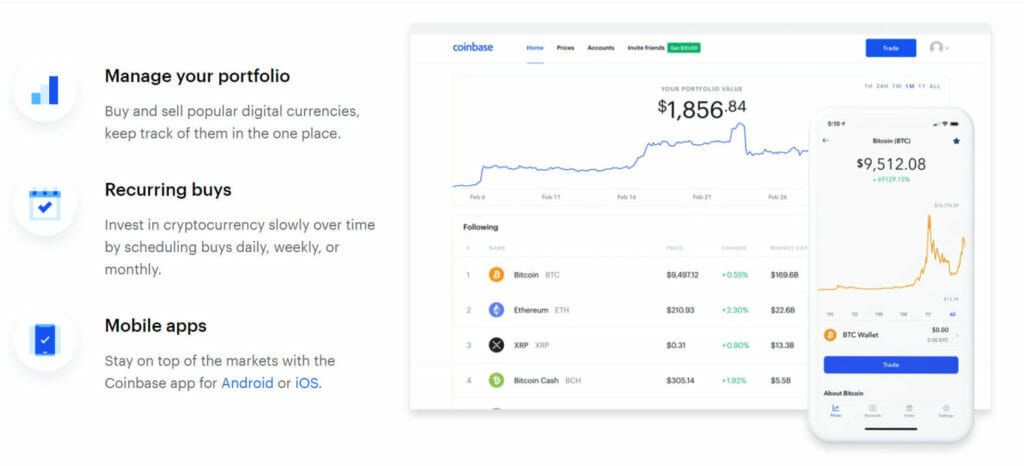
Bybit vs Coinbase: Referral Program
Bybit’s referral program is instead a maundering one. It states that “When a new user who registers on Bybit with your referral code, makes a first-time deposit of no less than $10 equivalent and meets the minimum total trading volume of $10,000 for derivatives trading (all pairs inclusive), or $2,000 for spot trading (all pairs inclusive) is qualified for rewards. With each qualified referral, you and your referee will each receive a $20 bonus in USDT. There is no limit to the number of friends you can refer to”.
Coinbase’s referral program is more generous. The referral program lets you earn a bonus for each friend (“invitee”) who signs up and makes a crypto trade using your personal signup link.
Also read, Binance vs Coinbase: Which is the best?
Bybit vs Coinbase: Deposit and Withdrawal Fees
When comparing exchanges, it is always essential to consider deposit and withdrawal fees. Neither Bybit nor Coinbase requires users to pay a deposit fee. For withdrawal, however, Bybit costs a certain amount of fees depending on the type of token you are withdrawing. More information about Bybit’s withdrawal fees can be found here.

On the other hand, Coinbase doesn’t charge its users a withdrawal fee. This makes it easy to withdraw crypto from the Coinbase exchange and store it on a hardware wallet, a practice strongly recommended. Coinbase charges what they call a “miner’s fee.” This is a fee designed to have smooth conduct of transactions for the consumer. The fees they charge will be disclosed at the time of your transaction.
Also read, Coinbase vs Cex.io: Best Exchange in USA
Bybit vs Coinbase: Pros and Cons
Coinbase: Pros and Cons
| PROS | CONS |
| Simple and intuitive User Interface | Trading fees are comparatively higher than other crypto exchange platforms. |
| A regulated platform | No future or derivatives trading |
| Available to US traders | |
| Trade volume for 24h more than 5 billion | |
| NFT trading available Extremely secure | |
| Extremely secure |
Bybit: Pros and Cons
| PROS | CONS |
| One of the lowest trading fees in the derivatives crypto market | UI might be a little intimidating for new traders. |
| Both spot and futures trading available | Unregulated |
| Less risky about price manipulation | Unavailable to US traders |
| One of the highest derivative trading volume | |
| NFT trading available | |
| Extremely secure |
Bybit vs Coinbase: Conclusion
While the central product and the target audience for the exchange platforms are entirely different, the comparison was still provided, including all the essential parameters to the best of our scope. Investing in either of them is pretty straightforward and beginner-friendly. Both Bybit and Coinbase are doing amazingly well in their respective fields, and it is entirely up to you which service you want to try and explore.
Is Bybit safe to use?
Yes, Bybit is safe to use. The assets in your bybit account are completely safe. Bybit has a number of security measures in place to protect your assets. It stores 100% of client funds offline in cold storage.
Is Coinbase regulated?
Yes. Coinbase complies with all applicable laws and regulations in each jurisdiction in which it operates.
Do I need KYC for completing my Bybit registration?
No, you just need a valid email address.
Also read,










